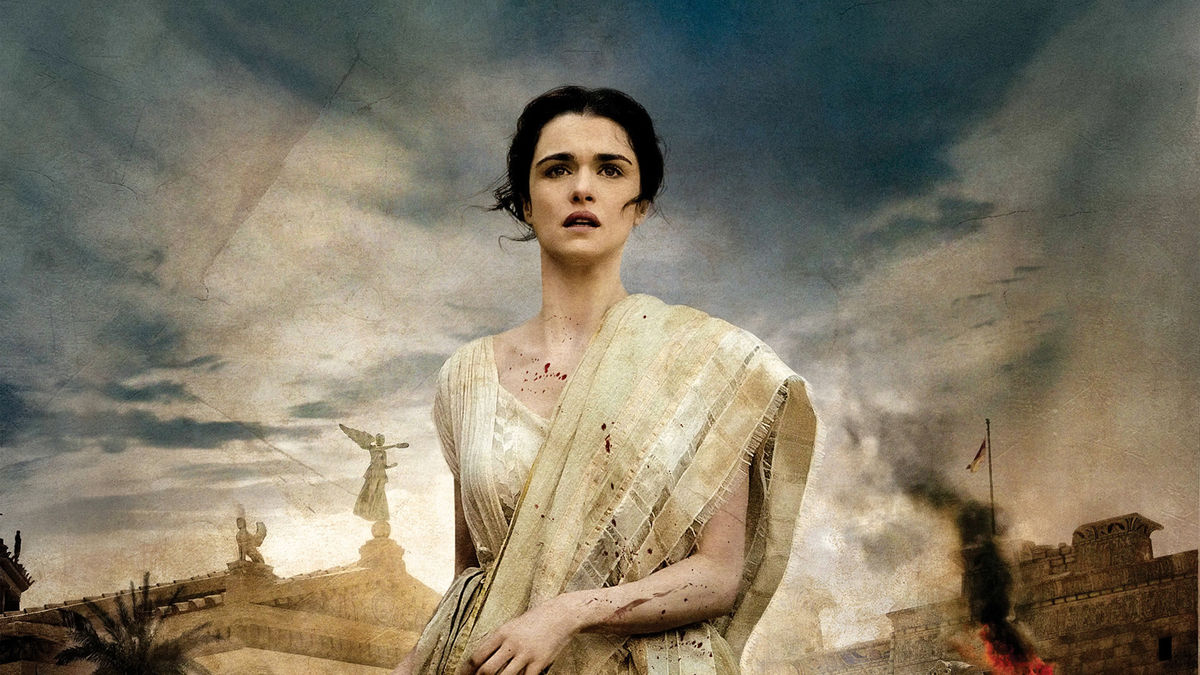By Chlotrudis Independent Film Society
Rating: 3 cats
Director: Alejandro Amenábar
Starring: Ashraf Barhorn | Max Minghella | Michael Lonsdale | Oscar Isaac | Rachel Weisz | Rupert Evans

Country: spain
Year: 2010
Running time: 127
IMDB: http://www.imdb.com/title/tt1186830/
Jason says: “I adore AGORA, and I’ll readily admit that a large part of it is that I agree with the politics and philosophy of the thing. Rather than it being a movie about a scientist who encounters something her rational outlook can’t explain and thus must learn to have faith, it’s a movie about how certainty allows people to do terrible things, and curiosity is a much more exhilarating emotion than comfort, and the stunning visuals and fine performances don’t do much to hide that.
“It’s 391 AD, and the Roman city of Alexandria, home to the greatest library of the time, is in turmoil. Christians are now allowed to practice their religion freely, which has served to bring tensions between them and those worshiping the traditional pagan gods out in the opening. Hypatia (Rachel Weisz), an astronomer and mathematician who is one of the few female teachers in this temple of learning, is not religious herself but welcomes all seekers of knowledge within her classroom. One of her students, Orestes (Oscar Isaac), would court her, even as he clashes with his Christian classmate Synesius (Rupert Evans). Soon, the war of words between Christians and pagans will boil over into a riot, with the aftermath leaving Alexandria a dramatically changed city and Hypatia in even greater peril.
“The story is not entirely or even primarily told from Hypatia’s point of view, though. The central figure is Davus (Max Minghella), one of her slaves. He follows her lectures better than any of her students and is thoroughly smitten with her, but is also being drawn to Christianity by charismatic street preachers and the promise of a more just world. His interactions with Hypatia are intriguing, an exaggerated version of class relations in any era – depending on the moment, she will treat her slaves as confidantes or little more than furniture; it’s no wonder Davus is pushed toward something that offers him certainty. And his arc with the Christians is certainly a pessimist’s view of religion – a man reaching for a place to belong, even as its unquestionable authority allow terrible things to be done in the name of God. Minghella is convincing as Davus goes through each step, convincing us of his growth from naive servant to warrior and beyond.
“Hypatia, then, is the contrast; and not just because her fortunes sink as Davus’s rise. As the religious (or, like Orestes, pragmatic) characters consolidate their power, she also looks to the heavens, but with curiosity; she becomes obsessed with understanding the motion of the sun, moon, stars, and planets. The point isn’t that she may come to understand gravity and momentum a thousand years before Newton, but that she is willing to make the conceptual leap that humanity is not at the center of the universe and re-evaluate everything she thinks she knows, which is the essence of ‘philosophy.’ Weisz is wonderful at displaying the pleasure of not knowing, and also does well at making Hypatia sympathetic while also being prickly and a woman of her time.
“It’s not all about good acting and the conflict between religion and science; AGORA is also an eye-popping historical epic. The filmmakers have created massive, detailed sets that are seamlessly extended by excellent visual effects work, as well as excellent costume and production design. It’s the next best thing to actually being in ancient Alexandria, and writer/director Alejandro Amenabar and cinematographer Xavi Gimenez shoot it beautifully. It’s captivating enough to give us a sense of the destruction during the massive riot/battle at the center, and Amenabar does an excellent job of using the second half to both show the effects of the new group’s ascent to power on a city-wide scale and also focus tightly on Hypatia and Davus.
“The parallels between the conflicts in AGORA and modern conflicts between religion and science, and different religions, are obvious. It’s a rousing and entertaining movie as well as a fable espousing rationality, though, and one of the most visually impressive of the year.
4 1/2 cats
“Seen 12 August 2010 at Landmark Kendall Square #4 (first-run)”
Thom says: “While I can freely admit the professionalism of the film I was lost in another historical film about the mire of fanatical religious hatred and killings. It’s apparently never going to end and to be reminded of it by this historical drama about 4th Century Alexandria and the phenomenal astronomer Hypatia, played by the always commanding Rachel Weisz, and her being caught in the conflagration between Christians and Jews with an obligatory romance thrown in plays unnecessary and forgettable. I have recently finished reading Quo Vadis by Nobel Prize winner Henryk Sienkiewicz (1905) and there were elements of that book here but I did like the change of point-of-view that in the novel the Christians were portrayed as heroes and here they are villains. So the interchangeable roles that various religions play always points to the opposite of what religions should really stand for, and that’s love of all humanity. I did love that the famous Library in Alexandria played a big role. 1 1/2 cats”
